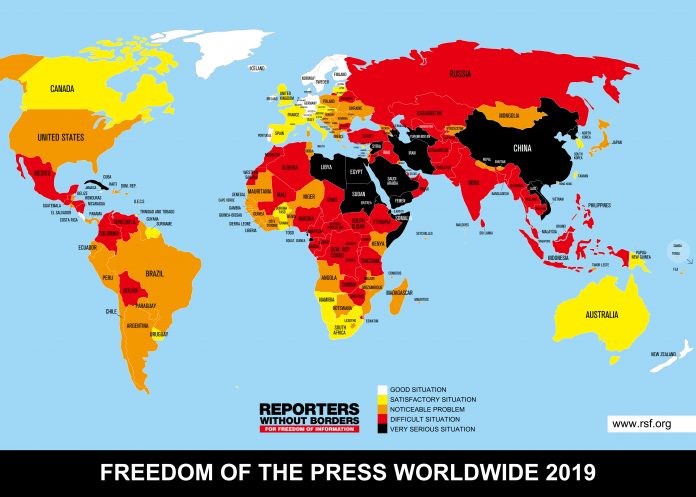On Wednesday, September 18, President Moon Jae-in met with Christophe Deloire, the secretary-general of Paris-based non-profit Reporters Without Borders (RSF) to publicly announce the South Korean government’s endorsement of the organization’s nascent Information and Democracy Commission. They were also joined by Cedric Alviani, director of RSF’s East Asia bureau, and Jung Kyu Sung, head of the Journalists Association of Korea.
At a press briefing following his meeting with Moon, Deloire praised the progress that South Korea had made with regards to press freedom and emphasized the important role he envisioned the country playing on the global stage as the currently highest ranking Asian country in RSF’s 2019 World Press Freedom Index. Deloire described how democracies are in danger due to the “information chaos” and “information jungle” of today’s media landscape, which has been defined by the competition between various types of content, including propaganda, advertising, journalism, vested interests, rumors. He noted that competition between these different kinds of content tends to take advantage of misinformation and so-called “fake news.”
North Korea a “black hole for information”
While South Korea is ranked 41st on RSF’s 2019 World Press Freedom Index, its neighbor North Korea occupies a much less lofty position on the same list — 179th out of 180 countries (Turkmenistan is the only country to rank lower than North Korea on the index). In response to a question about this stark contrast between the two Koreas and the ongoing infringement of the North Korean people’s right to freedom of information and expression, the RSF secretary-general stressed that the issue of bolstering these freedoms is not the same in democratic and authoritarian societies.
RSF representatives highlighted the challenges unique to seeking to improve the information and media landscape in a country like North Korea. Deloire described North Korea as a “black hole for information,” and Alviani drew parallels between the Chinese government’s recent efforts to export a form of journalism that is in effect state propaganda and the North Korean government’s own propagandist strategy.
In RSF’s explanation about North Korea’s ranking in the index, the organization cites the regime’s ironclad control over communication and the use of political prison camps as a punishment for consuming foreign media as mechanisms by which its citizens are confined to a “state of ignorance.” The only source of news permitted by the regime is provided by the Korean Central News Agency (KCNA).
Daily NK has long highlighted the lack of press freedom in North Korea citing information from RSF, along with other data on North Korea’s media environment produced by Freedom House. Unification Media Group (UMG) recently released a report detailing the shifting media landscape in North Korea. The report highlighted the fact that North Koreans are accessing more and more foreign information despite intensifying crackdowns by the state, which punishes those distributing or even watching foreign media by sending them to forced labor camps.
About the World Press Freedom Index
RSF’s index is a ranking of the degree of freedom afforded to journalists in different countries around the world. The index used both qualitative data and quantitative data. Qualitative data includes information sourced from media professionals, lawyers, and sociologists and focuses on the factors such as pluralism, media independence, the information environment and self-censorship, impact of the legislative framework, transparency, and quality of infrastructure. Quantitative data focuses on tallying the number of abuses and violence committed against media actors. The qualitative and quantitative data are then aggregated and each country is ranked according to the overall score they receive.
Please direct any comments or questions about this article to dailynkenglish@gmail.com.


















